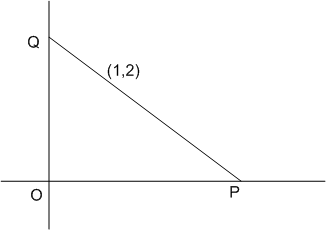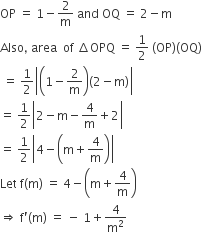 Multiple Choice Questions
Multiple Choice QuestionsA line is drawn through the point (1, 2) to meet the coordinate axes at P and Q such that it forms a triangle OPQ, where O is the origin. If the area of the triangle OPQ is least, then the slope of the line PQ is
-1/4
-4
-2
-2
C.
-2
The slope of line PQ 
Let 'm' be the slope of the line PQ, then the equation of PQ is
y -2 = m (x-1)
Now, PQ meets X-axis at P  and y-axis at Q (0,2-m)
and y-axis at Q (0,2-m)
⇒ 
Now, f'(m) = 0
m = ± 2
f(2) =0
f(-2) = 8
Since, the area cannot be zero, hence the required value of m is -2
Three distinct points A, B and C are given in the 2 – dimensional coordinate plane such that the ratio of the distance of any one of them from the point (1, 0) to the distance from the point ( - 1, 0) is equal to 1/3 . Then the circumcentre of the triangle ABC is at the point
(0,0)
(5/4, 0)
(5/2, 0)
(5/2, 0)
The point diametrically opposite to the point P (1, 0) on the circle x2+ y2 + 2x + 4y − 3 = 0 is
(-3,4)
(-4,3)
(-3,-4)
(-3,-4)
The perpendicular bisector of the line segment joining P (1, 4) and Q (k, 3) has y−intercept − 4. Then a possible value of k is
1
2
-2
-2
A body falling from rest under gravity passes a certain point P. It was at a distance of 400 m from P, 4s prior to passing through P. If g = 10 m/s2 , then the height above the point P from where the body began to fall is
720 m
900 m
320 m
320 m
A straight line through the point A(3, 4) is such that its intercept between the axes is bisected at A. Its equation is
x + y = 7
3x − 4y + 7 = 0
4x + 3y = 24
4x + 3y = 24
The two lines x = ay + b, z = cy + d; and x = a′y + b′, z = c′y + d′ are perpendicular to each other if
aa′ + cc′ = −1
aa′ + cc′ = 1


The system of equations
αx + y + z = α - 1,
x + αy + z = α - 1,
x + y + αz = α - 1
has no solution, if α is
-2
either-2 or 1
not -2
not -2
Two points A and B move from rest along a straight line with constant acceleration f and f′ respectively. If A takes m sec. more than B and describes ‘n’ units more than B in acquiring the same speed then
(f - f′)m2 = ff′n
(f + f′)m2 = ff′n
1/2(f - f′)m = ff′n2
1/2(f - f′)m = ff′n2
